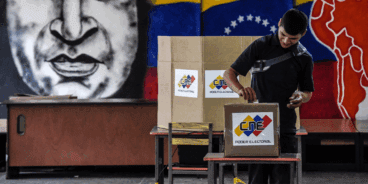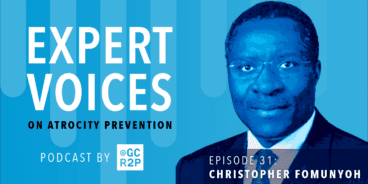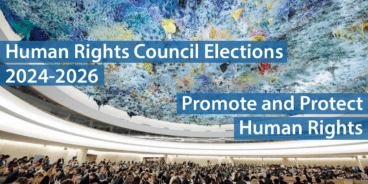
Statement on the Situation in Côte d’Ivoire, December 2010
There is a serious risk of mass atrocities in Côte d’Ivoire. On 16 December, government security forces loyal to incumbent President Laurent Gbagbo opened fire on opposition supporters protesting in Abidjan, killing at least twenty people and injuring unknown numbers. The clash between security forces and supporters of presidential candidate Alassane Ouattara occurs in a context of heightened post-electoral tensions in which both Gbagbo and Ouattara claim victory. An escalation in the situation could easily lead to the commission of mass atrocities, crimes that states committed themselves to protect populations from in adopting the responsibility to protect (R2P) at the 2005 World Summit, and a return to armed conflict. In keeping with the responsibility to protect, swift domestic and international action must be taken to deter actors from committing or inciting atrocities and resorting to violence to retain or secure power.
Today’s show of excessive force is unsurprising given the history of abuses by the security forces. During the 2000 elections over 200 people were killed in clashes with the military and police. The culture of impunity that has prevailed since then has done little to dissuade government forces from using excessive force against civilians. Individuals from the north, who are often regarded as supporters of Ouattara, are especially vulnerable to attacks by the security forces, as are Muslims and immigrants from other West African countries. Northerners face xenophobia as they are perceived by some to be foreigners, a factor that has contributed to their being targeted in the past and the subject of hate speech today.
The potential for further escalation is all too real, especially as both sides draw support from armed elements. The army chief of staff has sworn the military’s allegiance to Gbagbo and there is a serious risk that security forces may increase their use of violence to secure Gbagbo’s – and their own – hold on power. The northern rebel group, Forces Nouvelles, which fought against the government and its allies in the 2002-2003 civil war and have yet to fully disarm, are loyal to the prime minister appointed by Ouattara, Guillaume Soro, and in turn oppose Gbagbo. They have declared that they are prepared to take up arms to remove the incumbent from power. With security forces and the Forces Nouvelles pitted against each other, the re-ignition of armed conflict is a real possibility and there is a significant risk that massacres, rapes and sexual abuse, torture and use of child soldiers – crimes against humanity and war crimes, perpetrated by all sides during the earlier conflict, will be committed again.
Conditions on the ground are deteriorating rapidly. Gbagbo has blocked the transmission of international broadcasts which creates an information vacuum that breeds rumors and fear, and makes it easier for state run news agencies to continue to broadcast incendiary messages, and possibly even incite listeners to violence as they have in the past. The 16 December protests, called for by Ouattara, were intended to lead to a march on the state run television and radio station and government buildings. In addition to reports of excessive use of force against protesters, violent clashes between government forces and the Forces Nouvelles have been reported, along with eyewitness accounts of heavy armament movements in the capital. Violence has also been reported outside Abidjan, with the western part of the country at particular risk for violent conflict. UNHCR reports that 4,200 Ivoirians have sought refuge in Liberia and Guinea.
State security forces, national authorities, and opposition officials have a responsibility to protect the people of Côte d’Ivoire from atrocities and their incitement. The security forces must exercise restraint, abide by international law and standards on the use of force, and protect all persons in Côte d’Ivoire irrespective of their political affiliation, ethnic, religious or national identity. It is imperative that the political impasse is resolved quickly and through peaceful means. Gbagbo and Ouattara must avoid instigating violence and demand that their supporters, including the security forces and Forces Nouvelles, refrain from the commission of atrocities and make it clear that those who incite or commit crimes will be held accountable.
The international community, led by the African Union (AU) and the Economic Community of West African States (ECOWAS), has been working to secure a peaceful political transition and to deter mass atrocities and armed conflict. These actors have, in keeping with their responsibility to protect, sought to identify sources of threats of violence and atrocities as well as measures to eliminate these threats while seeking to uphold a nascent democratic process in Côte d’Ivoire. ECOWAS, the AU and the United Nations (UN) have recognized Ouattara as president and the AU and ECOWAS have suspended Côte d’Ivoire from their organizations in response to Gbagbo’s refusal to step down. The European Union has enacted targeted travel and financial sanctions on Gbabgo, and the deputy prosecutor of the International Criminal Court (ICC) has publicly declared that all acts of violence will be closely examined by the Office of the Prosecutor.
These measures and the considerable attention focused on Côte d’Ivoire are a positive sign. However, given the real and growing threats, international actors, notably the AU, ECOWAS, UN, UN Security Council and key states including Nigeria and the United States, must maintain pressure on the parties to prevent any further escalation of violence. They must strive to identify and tackle the incentives that exist for resorting to violence and utilize additional measures and sources of leverage to create credible deterrence. Contingency plans should be developed outlining scenarios whereby atrocities may occur and identifying what preventive and protective measures need to be taken, and by whom. Such plans must also set out the options for further action should preventive efforts fail.
The UN Security Council has a critical role to play in averting and halting atrocities in Côte d’Ivoire. It has already acknowledged in previous resolutions that a threat to international peace and security exists and that it is empowered to act. The Council has a number of tools at its disposal to increase pressure on Gbagbo and Ouattara, their supporters, and those who may take up arms, to behave in a responsible way. Among the measures that the Council should adopt is the expansion of the list of individuals facing targeted sanctions as well as enforcement of the arms embargo currently in place. It should also make clear that those who incite or commit mass atrocities will be held accountable by domestic authorities, or failing that, by the ICC.
While the responsibility to protect places a special emphasis on prevention, in unanimously adopting R2P, member states have accepted a responsibility to take action to protect and save lives should preventive efforts fail. Part of the UN peacekeeping operation in Côte d’Ivoire’s (UNOCI) Chapter 7 mandate is to “protect civilians under imminent threat of physical violence.” It is imperative that UNOCI is able to fulfill this mandate, this includes deploying to areas where populations face the greatest risk, being prepared to take robust action, and having the resources necessary to do so. The UN Security Council should in turn send a clear message that it expects UNOCI to fulfill this mandate. The Council deployed on 24 November additional peacekeeping troops from the UN Mission in Liberia (UNMIL) to UNOCI for a period of four weeks to bolster security around the election, this is a positive step. The Council must be prepared to renew their presence, while seeking alternatives to ensure that UNMIL’s ability to fulfill its mandate is not compromised. Debates in the Council about the UN’s role in certifying the election results threatens to obscure a key issue for the Council – the current risk of mass atrocities in Côte d’Ivoire. The Council’s role, and its priority, should be using every means possible to deter and dissuade actors from the commission of atrocities and from a return to armed conflict.
It is critical that, in keeping with the responsibility to protect, efforts are focused on the immediate need to ensure the protection of all persons in Côte d’Ivoire, by preventing the situation from escalating to the point where mass atrocities occur. This is not the time for wavering; it is the time for unified action to save untold numbers of lives.
Related Content


Expert Voices on Atrocity Prevention Episode 31: Christopher Fomunyoh
